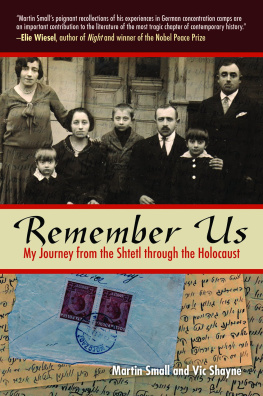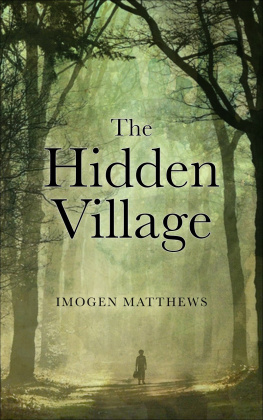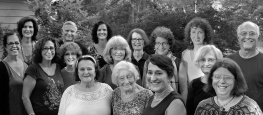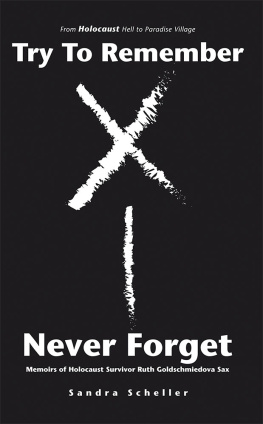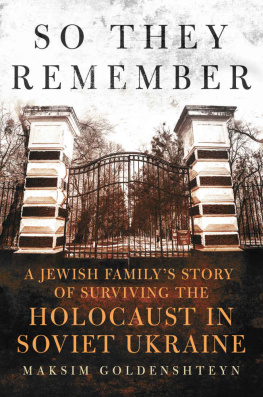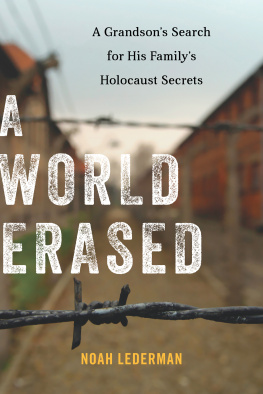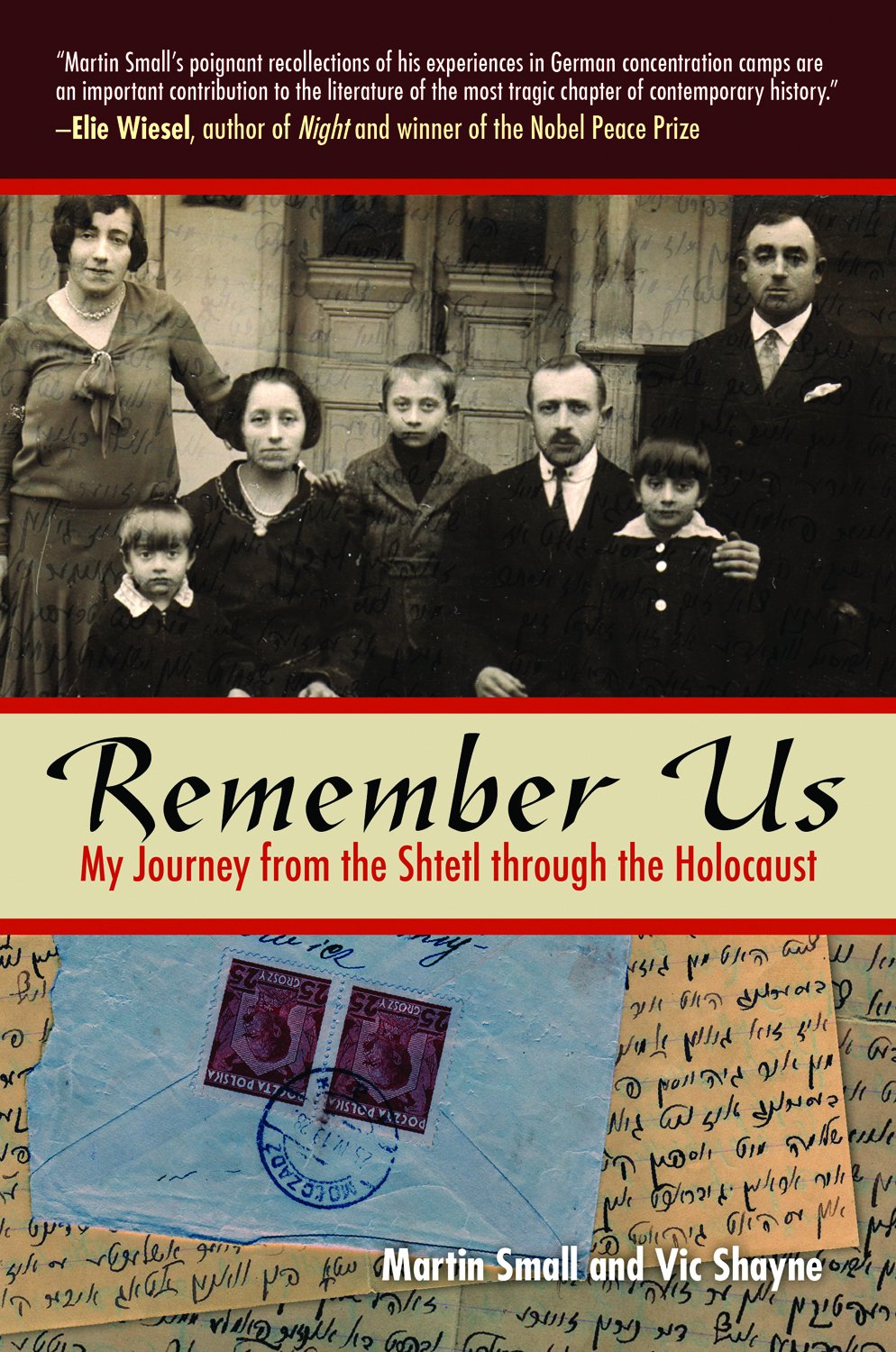Acknowledgments
A s you may imagine, there have been hundreds of people over the past ninety-one years who deserve credit for their positive influences in my life. But lets begin first with those most directly helpful in making this book possible.
Thank you to my writer, Vic Shayne, whose thoughts have melded with my own so that I could bring to bear this difficult account of life, love, and loss.
Thank you to my wife, Doris Small, a fellow Holocaust survivor who, with her sister Ida, barely escaped Kristallnacht and exportation when they joined the Kindertransport and fled to England at the start of World War II. And thank you to my daughter, Miriam, for her love, encouragement, and the photographs she provided for this book.
Thanks to my son-in-law, Bill; granddaughter, Jenniffer Rachel; and her husband, John; my great granddaughter, Samantha; and Jenniffers boys,Vance David and Ezra.Also thanks to Jacob Michael, my grandson; his wife, Jennifer; and their son, Julian, and daughter, Jaden Elka (named after my sister Elka).
A special note of appreciation goes to Josh Shayne for his cover design and for assisting with all of the computer work needed to make this book a reality.
Thanks to Myrna and Shael Siegel for providing photos, background information, and support, as well as for Myrnas tireless work on the Maitchet Yitzkor book. Myrna and her husband were brave enough to return to Maitchet many years after the war to videotape the town and outlying areas. Representing all of us from this shtetl, Myrna said kaddish at the monument where my family, and hers, were murdered along with three thousand other Jews in the summer of 1942.
No amount of words can describe my appreciation for my friend Jim Curry, retired New York City policeman and, years before that, Army soldier of the 65th Infantry Division. Thanks to Beth Eberhard for contacting author Vic Shayne about her father, Captain Elmore Fabrick of the United States Army, who fought through Europe to one day be among the liberators of Mauthausen concentration camp. The world will never know how brave and great these American soldiers were as they persevered and fought to end the madness of the Holocaust era. Too many of them, albeit for the right reasons, have kept their experiences locked up in the recesses of their memory owing to the pain of revisiting the trauma that marked their lives during the war years.
Thanks to Jody Berman for her professional proofreading services and encouraging words.
I also want to thank my friend, Andrea Jaracz, who shared her thoughts about this book, saying, This is a story quite difficult to ponder, much less to live through. So much hatred has been poured into Martin Smalls life, yet he exudes love. It is plain to see that the enemy, who has diligently tried to rob him of all human dignity, has failed miserably.
Another personal friend, Irene Calvano, wrote these supportive words: During the reading of this book, I was privileged to be able to share the details of the wonderful childhood bestowed on a very few, and then gradually the horrors bestowed on many millions. To be able to call Martin Small a friend is one of the grandest privileges one can have in life.
I thank every family member and friend who read this book with interest and gentle guidance.
Much appreciation as well goes to veteran actors Ed Asner and Jerry Stiller for taking their time to read the manuscript for this book, as well as friends Rabbi Zalman Schachter, Irving Roth, Cynthia Nieb, Victoria McCabe, George Lichter, and George Maxwell, MD.
Last but not least, I would like to mention my family from New York who helped me feel at home when I came to America in 1950. Of course, there was Aunt Frieda, my mothers sister; and Friedas cousin, Uncle Harry Berman, who came to find me in Italy. But theres also my extended family, who welcomed me home with open arms, beginning with my cousin, Ruby Watskin, and his wife, Frieda; and Rubys brother, Murray. Also supporting me were my cousins, Larvey Plotkin, and his wife, Ida. All of these newfound relatives, I learned, helped put up the money to bring me to America (Ruby and Murray Watskin, along with Aunt Frieda, supplied the affidavit for me to come here). Frieda and Ida were daughters of my Aunt Friedas brother, Schmerl Berman. I also came to know Frieda and Ruby Watskins daughter, Cynthia (my second cousin), and their son, Jerry. Plus, I met Idas son, Elliot, and daughter, Joni; as well as Ruby and Morries brother, Larry.
Further, upon coming to America, I was connected with other relatives from my mothers side of the family. About twenty kilometers from Maitchet, in a shtetl called Zetel, lived the family of my mothers sister, Yachna Senderowski, who was from another father. Yachna had two sons, Hilka and Isroel, and a daughter named Rywka who married Baruch Silberklang. Rywkas son, Melvin, was born in Germany in a DP camp. When the Silberklangs moved to New York, they had one more addition to their family, a son named David (now professor in the Rothberg International School of the Hebrew University in Jerusalem, where he serves as editor-in-chief of Yad Vashem Studies) with whom I frequently communicate as he travels the world as an educator.
My deepest appreciation goes out to all who have uplifted my life.
Appendix
Gentle Snowflakes Falling
E vidence of the Holocaust can be found in hundreds of thousands of places, with the most obvious being in museums and the least obvious in private collections stashed in dark corners of closets. Most of the testimonials have never been written and remain in traumatized memories. Many have been passed along to close friends, wives, daughters, sons, grandchildren, and, occasionally, therapists. The trauma of the Holocaust is a worldwide phenomenon, not just a Jewish one. To think otherwise is to invalidate the suffering of others and to be ignorant of the enormity of the war and all of its victims, from soldiers to partisans and from concentration camp inmates to resistance fighters and from rescuers to civilians who lived through hell on earth.
Some of the most awe-inspiring testimonials were recorded by the American soldiers who came upon the Nazi death camps across Europe. There were privates, sergeants, lieutenants, captains, colonels, majors, and generals (Eisenhower and Patton are most notable), as well as military medical personnel.
George S. Maxwell, MD, a retired orthopedic surgeon, wrote the following when he was with the 131 Evac Hospital and came to Mauthausen in May, just days after the liberation:
Upon approaching, we were met by MPs who had preceded us by some hours. We were told to enter on foot, no vehicles in the camp. The forbidding iron entry gate, now propped open, led to a complex of large ugly brick buildings two to three stories high surrounding the central open area. There was an eerie silence, no talking or commotion of any kind, just the buzzing of millions of flies. The ground was covered with liquid feces which we learned was the ubiquitous starvation diarrhea.The smell was powerful. I recall battle hardened GIs vomiting. I too was sick.
The few individuals who were standing moved very slowly and appeared dazed. As we got further in we saw the hundreds upon hundreds of prisoners seated side by side against the building walls. Most were naked and looked like skeletons with tightly drawn skin.They seemed lifeless and it turned out many were....We all felt helpless and stunned by the magnitude of this tragedy. An effort was made to get water to those who could swallow. From the onset it was obvious that the priorities were getting nourishment to the living and removing the dead.

